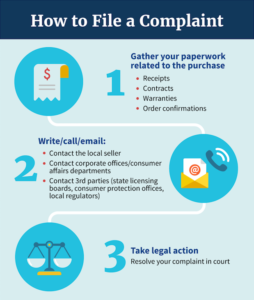Suppose you want to know how to lodge a formal Complaint in Turkey as a Foreigner for purchases as consumers, your bank, or tour operator. How to file a lawsuit for all related matters, keep on reading. We will clarify and state details, steps, and the legal process:
Filing a Complaint as a Consumer:
As a foreigner, you have the same consumer protection rights as a Turkish national, including the right to return goods.
According to Turkish law, consumers can return the purchased product within 14 days without giving any reason, provided that the goods are not damaged, and entitled to a full refund. This does not apply to most jewelry and underwear (due to hygiene reasons) and perishable items.
When you experience an issue with a product or the sales process, you have two options in Turkey. You can either contact the Consumer Arbitration Committee and report the problem or raise the issue through your lawyer and consumer courts if you have not been able to resolve the issue.
In both cases, you are obliged to inform the seller/delivery company, etc., of the nature of your dispute and give them a reasonable time, which is 14 days, to fix the issue.
-
The Turkish Consumer Arbitration Committee:
The Consumer Arbitration Committee deals with consumer disputes for items whose value is no more than TL 11,330 for the year 2021. This figure changes every year.
For items whose value is less than TL 7,550, you will have to apply to the district committee, and for those more than that figure but up TL 11,330, you will need to apply to the provincial committee.
You can make your application in person or through a lawyer, which will be registered in the Consumer Information System (TÜBİS), by post or electronically via e-devlet.
As part of your application, you will be asked to write a petition detailing your issue and attach supporting documents.
You should expect to hear back within six months at the latest but know that this decision period may extend this decision period for a maximum of six months for one-time only. There are also no trials or public hearings for the decision.
For disputes involving goods whose value exceeds TL 11,330, you will have to apply to the Special Court of Consumer Rights, the procedure of which is the same as any civil court proceeding.
Applying to the consumer arbitration committee or consumer courts is complimentary.
*If you are a foreign national who does not reside in Turkey, may give your case priority.
File a Complaint about Your Travel/Accommodation Provider:
If you have a complaint about your travel agency or tour operator, I will advise you to talk to them first to try and resolve the issue and possibly get a refund. Explicitly stating your dissatisfaction to the head office as a written complaint is also highly encouraged.
However, suppose these talks are not being taken seriously and dissatisfied with the company’s response. In that case, you can send a report of the situation or incident to the Association of Turkish Travel Agencies (TÜRSAB) or the Hotel Association of Turkey (TÜROB).
Note: To ask for TÜRSAB’s help in rectifying the situation, your travel provider/hotel must be a member of the association.
If the situation is difficult, you can also contact your credit card company to file a complaint, which will prompt them to open an investigation.
Receiving a response from these associations may take a while, so try to be patient.
File a Bank Complaint:
You will first have to write a petition to the bank before filing a formal complaint to the Arbitration Panel.
This petition must be made in writing, and you should be given an “application confirmation certificate” from the bank, signed by a bank officer. It would help if you also were given a copy of this document.
In some cases, banks also may accept e-mails or complaints made via the bank’s website. The important thing is to keep track of your application and get a receipt showing that it has been received.
After you receive a response from the bank, you can fill in the “Customer Complaints Arbitration Panel – Application Form” under “e-Services” one-Devlet, aka the e-Government Gateway. You will be asked to attach the bank’s response to this form.
If you want to complain to your bank as a trader, you will have to file a lawsuit in commercial courts of the first instance.
Your bank has 30 days to reply to your complaint from the date of issue of the application confirmation certificate. If you are contesting payments about your credit or debit cards, you should hear back within 20 days.
After raising the case with the arbitration panel, you should expect a decision in 60 days.
How to Collect Debt in Turkey:
If you are a foreign creditor and your debtor is located in Turkey, you are entitled to file a lawsuit or initiate enforcement proceedings under Turkish law.
However, when you are a foreign national, there is one caveat to filing a lawsuit against your debtor.
Unless there is a reciprocal agreement between Turkey and your country, such as through the Hague Convention, you may be asked to pay a security deposit to the court to cover court expenses and damages if you fail to prove your case. The amount will depend on the amount you claim and will be determined by the court.
You must first ask your debtor to pay the amount they owe you either verbally or in writing, though the latter is highly recommended to serve as legal notification of payment. It will usually be through a lawyer and notary. It is considered a part of the pre-legal procedure.
If your debtor does not try to arrange the payment or refuses to pay within 10 days of receiving this notice, you can proceed with filing a lawsuit.
-
How to file a lawsuit (for debt):
While filing your lawsuit, you will be asked to present various documents.
Regardless of your nationality, submitting the following documents will act as supporting evidence when filing for debt recovery in Turkey:
-
Any agreements or contracts evidence the relationship between the debtor and the creditor, invoices or copies of the confirmation of orders, delivery documents, correspondence between both parties, etc.
Such documents will always have to be translated into Turkish and notarized.
The claim you will file must clearly state the name of the court, the name and address of the creditor and the debtor as well as of their attorneys or legal representatives, the amount due, the circumstances of and legal reasons the claim, demands from the court, and a power of attorney (if applicable).
The procedure is the same for other types of disputes. To file a lawsuit, you must start by drafting a petition and submitting supporting documents for your case to the relevant court.
The claimant bears the cost of litigation at first, but the losing party gets charged in the end if not stated otherwise in law. You will have to fund procedural costs, including an application fee, service, postal fees, taxes, and other expenses such as obtaining official documents from authorities, getting them translated, etc.
However, a lawsuit must be your last resort, as cases can take a long time to be seen. In 2010, the Turkish Ministry of Justice found that it took an average of 209 days for a civil case to decide.
A Word on Labor Disputes:
If you want to file a lawsuit against your employer in Turkey for reasons such as unfair dismissal or compensation, you will first have to seek mediation. It is a precondition to filing a Labor Law case.
For such cases, it is best to seek help from a lawyer first.
How to File a Complaint with Prosecutors:
How and why will open a criminal case depends on the crime committed, and the trial begins with an investigation.
You cannot open a criminal case as an individual; the prosecutor’s office can only do this.
You will first have to complain to the prosecutor, who will then initiate an investigation and collect evidence. You should expect to hear back within 6 months.
Only if it is deemed necessary will your complaint be turned into a criminal case.
Length of Time to Process Legal Complaints:
As per Article 7 of the Law. In the Use of the Right to Petition, authorities have to respond within 30 days at the latest.












